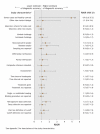Evidence of bias and variation in diagnostic accuracy studies
- PMID: 16477057
- PMCID: PMC1373751
- DOI: 10.1503/cmaj.050090
Evidence of bias and variation in diagnostic accuracy studies
Abstract
Background: Studies with methodologic shortcomings can overestimate the accuracy of a medical test. We sought to determine and compare the direction and magnitude of the effects of a number of potential sources of bias and variation in studies on estimates of diagnostic accuracy.
Methods: We identified meta-analyses of the diagnostic accuracy of tests through an electronic search of the databases MEDLINE, EMBASE, DARE and MEDION (1999-2002). We included meta-analyses with at least 10 primary studies without preselection based on design features. Pairs of reviewers independently extracted study characteristics and original data from the primary studies. We used a multivariable meta-epidemiologic regression model to investigate the direction and strength of the association between 15 study features on estimates of diagnostic accuracy.
Results: We selected 31 meta-analyses with 487 primary studies of test evaluations. Only 1 study had no design deficiencies. The quality of reporting was poor in most of the studies. We found significantly higher estimates of diagnostic accuracy in studies with nonconsecutive inclusion of patients (relative diagnostic odds ratio [RDOR] 1.5, 95% confidence interval [CI] 1.0-2.1) and retrospective data collection (RDOR 1.6, 95% CI 1.1-2.2). The estimates were highest in studies that had severe cases and healthy controls (RDOR 4.9, 95% CI 0.6-37.3). Studies that selected patients based on whether they had been referred for the index test, rather than on clinical symptoms, produced significantly lower estimates of diagnostic accuracy (RDOR 0.5, 95% CI 0.3-0.9). The variance between meta-analyses of the effect of design features was large to moderate for type of design (cohort v. case-control), the use of composite reference standards and the use of differential verification; the variance was close to zero for the other design features.
Interpretation: Shortcomings in study design can affect estimates of diagnostic accuracy, but the magnitude of the effect may vary from one situation to another. Design features and clinical characteristics of patient groups should be carefully considered by researchers when designing new studies and by readers when appraising the results of such studies. Unfortunately, incomplete reporting hampers the evaluation of potential sources of bias in diagnostic accuracy studies.
Figures


Comment in
-
Sources of bias in diagnostic accuracy studies and the diagnostic process.CMAJ. 2006 Feb 14;174(4):481-2. doi: 10.1503/cmaj.060014. CMAJ. 2006. PMID: 16477059 Free PMC article. No abstract available.
Similar articles
-
Empirical assessment of bias in machine learning diagnostic test accuracy studies.J Am Med Inform Assoc. 2020 Jul 1;27(7):1092-1101. doi: 10.1093/jamia/ocaa075. J Am Med Inform Assoc. 2020. PMID: 32548642 Free PMC article.
-
Empirical evidence of design-related bias in studies of diagnostic tests.JAMA. 1999 Sep 15;282(11):1061-6. doi: 10.1001/jama.282.11.1061. JAMA. 1999. PMID: 10493205
-
[Methodological bias and variation of systematic reviews on diagnostic test accuracy].Zhonghua Liu Xing Bing Xue Za Zhi. 2016 Feb;37(2):286-90. doi: 10.3760/cma.j.issn.0254-6450.2016.02.027. Zhonghua Liu Xing Bing Xue Za Zhi. 2016. PMID: 26917532 Chinese.
-
Towards complete and accurate reporting of studies of diagnostic accuracy: the STARD initiative.Clin Chem Lab Med. 2003 Jan;41(1):68-73. doi: 10.1515/CCLM.2003.012. Clin Chem Lab Med. 2003. PMID: 12636052
-
Toward complete and accurate reporting of studies of diagnostic accuracy. The STARD initiative.Am J Clin Pathol. 2003 Jan;119(1):18-22. doi: 10.1309/8EXC-CM6Y-R1TH-UBAF. Am J Clin Pathol. 2003. PMID: 12520693 Review.
Cited by
-
Empirical assessment of bias in machine learning diagnostic test accuracy studies.J Am Med Inform Assoc. 2020 Jul 1;27(7):1092-1101. doi: 10.1093/jamia/ocaa075. J Am Med Inform Assoc. 2020. PMID: 32548642 Free PMC article.
-
The impact of colorectal screening program on the detection of right-sided colorectal cancer. A 5-year cohort study in the Mantua District.Int J Colorectal Dis. 2015 Dec;30(12):1627-37. doi: 10.1007/s00384-015-2352-1. Epub 2015 Aug 9. Int J Colorectal Dis. 2015. PMID: 26255258
-
The validation of screening tests: meet the new screen same as the old screen?J Gambl Stud. 2012 Dec;28(4):573-605. doi: 10.1007/s10899-011-9285-6. J Gambl Stud. 2012. PMID: 22203270 Review.
-
Serological testing for SARS-CoV-2 antibodies in clinical practice: A comparative diagnostic accuracy study.Allergy. 2022 Jul;77(7):2090-2103. doi: 10.1111/all.15206. Epub 2022 Jan 11. Allergy. 2022. PMID: 34986501 Free PMC article.
-
Adjunctive tests for diagnosis of tuberculosis: serology, ELISPOT for site-specific lymphocytes, urinary lipoarabinomannan, string test, and fine needle aspiration.J Infect Dis. 2011 Nov 15;204 Suppl 4(Suppl 4):S1130-41. doi: 10.1093/infdis/jir450. J Infect Dis. 2011. PMID: 21996695 Free PMC article. Review.
References
-
- Reid MC, Lachs MS, Feinstein AR. Use of methodological standards in diagnostic test research. Getting better but still not good. JAMA 1995;274:645-51. - PubMed
-
- Harper R, Reeves B. Compliance with methodological standards when evaluating ophthalmic diagnostic tests. Invest Ophthalmol Vis Sci 1999;40:1650-7. - PubMed
-
- Schulz KF, Chalmers I, Hayes RJ, et al. Empirical evidence of bias. Dimensions of methodological quality associated with estimates of treatment effects in controlled trials. JAMA. JAMA 1995;273:408-12. - PubMed
-
- Moher D, Pham B, Jones A, et al. Does quality of reports of randomised trials affect estimates of intervention efficacy reported in meta-analyses? Lancet 1998;352:609-13. - PubMed
Publication types
MeSH terms
Grants and funding
LinkOut - more resources
Full Text Sources
Medical
